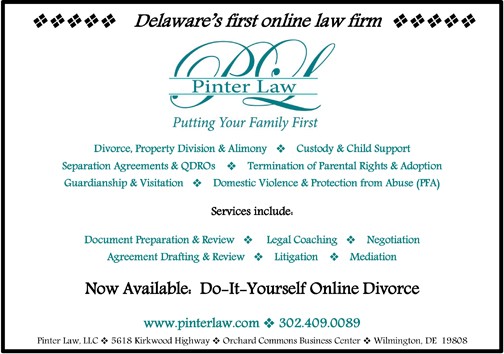Custody – It’s What’s Best for the Kids, Pt. 2
This article is the second in a two-part series on child custody in Delaware. The first article, which can be found on our websites, www.pinterlaw.com and www.pinterlawonline.com, covered the definition of custody and how it is decided in Delaware. This issue explains when to file for custody, what to expect, and when you should settle or have a hearing.

By Shana A. Pinter, Esq.
To begin, I usually recommend to my clients that they should always file for custody because having a written custody order protects everyone when the inevitable disagreement arises. If there is no custody order in place, you and your ex are left to your own devices to try to resolve the problem(s).
So let’s assume that you’ve filed for custody with the Family Court. Unless there is a PFA (Order of Protection from Abuse) in place the Court will schedule you for a Family Court Mediation held at the Family Court of the county in which you file. This Mediation is led by a Family Court Mediator specially trained and experienced in dealing with custody and all other family law issues.
The Mediation is for you and your child(ren)’s other parent to reach a decision – you must attend the Mediation but actually reaching a decision is voluntary. You don’t have to agree to anything at Mediation BUT you will most likely leave with at least a “Temporary Custody and Visitation Order” which adheres to the contact guidelines, which can be found on our website under “Resources” and also at the website of the Family Court of Delaware (http://courts.delaware.gov/Help/Visitation/visitation.stm).
If you can’t agree at Mediation, a hearing before a Judge of the Family Court is scheduled. At a hearing, both parents will testify about what they want and why they think that is best for the children. You should view this as your one and only time before the Judge and your only chance to tell the Judge everything. After your hearing the Judge will issue an opinion which generally can’t be changed, or “modified,” for two years.
The next question is: “When should I settle?” In short, and this applies to all areas of law, you want to settle if what you can get by settling is better than or the same as what you would be awarded if you went to Court.
For instance, if the child(ren) is over the age of five, there’s no substance abuse, no domestic violence, and both parents provide a stable and nurturing environment to the child(ren), among other factors, it’s better to agree to joint legal custody and shared residence (see “It’s What’s Best for the Kids – Pt. 1” for an explanation of custody and each parent’s rights and obligations) because that would most likely be awarded by the Judge if you had to go to Court.
On the flipside, it’s better to go to a hearing if the other side is insisting on primary residence of the child(ren) and there are no reasons for that to be awarded – reasons like the child(ren) gets upset when they have to switch houses, you eat with the kids at a fast-food restaurant each week, or you’re living with your parents while you get back on your feet and the living quarters are tight, you are most likely better off pursuing your case in Court because these objections are not significant enough, in and of themselves, to award primary residence to one parent. So if you were to agree at Mediation to allow the other side to get primary residence you would be getting less than if you have your case heard and decided by a Judge.
For more information about custody and the law firm of Pinter Law, LLC, please visit our websites at
www.pinterlaw.com and www.pinterlawonline.com.
Shana A. Pinter, Esq., is the founding attorney of Pinter Law, LLC, a law firm dedicated primarily to family law. She has been practicing since 2009 and founded Pinter Law, LLC, to increase access to legal assistance to those facing challenges within their families. This article is provided for informational purposes only, does not constitute and should not be relied upon as legal advice, and is not guaranteed to be correct, complete or up-to-date.


